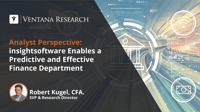We conducted our recent Smart Financial Close Dynamic Insights Research in part to assess to what extent the substantial disruptions of the pandemic have impacted the accounting close. When office lockdowns began in the first quarter of 2020, many finance departments were challenged to conduct the quarterly close remotely without face-to-face interactions. In the United States, the Securities and Exchange Commission was so concerned that corporations would be unable to meet filing deadlines...
Read More
Topics:
Office of Finance,
Financial Performance Management,
ERP and Continuous Accounting,
digital finance,
Smart Financial Close
insightsoftware provides applications for finance departments and other business users in midsize and larger organizations, offering a broad range of functions including analysis, internal and regulatory reporting, planning, consolidation, tax provision and treasury. The software brings together applications that enable business users to maximize data collected in existing systems and streamline the performance of a range of office of finance functions, all while limiting or eliminating the...
Read More
Topics:
Office of Finance,
embedded analytics,
Business Intelligence,
Business Planning,
Financial Performance Management,
ERP and Continuous Accounting,
digital finance,
profitability management,
Revenue, Lease and Tax Accounting
Trintech provides finance departments in midsize and larger organizations with software to accelerate their accounting close processes. This record-to-report (R2R) cycle is complex because it involves the coordination of numerous people, many systems and multiple sources of data. There are iterative portions that involve cycles of reviews and multiple levels of approvals. These include reconciliations and adjusting of entries during the close as well as authoring, editing and updating...
Read More
Topics:
Office of Finance,
Financial Performance Management,
ERP and Continuous Accounting,
digital finance
The subscription and recurring revenue business models became a significant part of the economy this century with the advent of streaming services for entertainment and software as a service. They have grown in popularity because they enhance customer lifetime value by evolving what had previously been a one-time-sale relationship into a delivery of ongoing services which can create a more loyal customer relationship as well as provide a regular, more predictable revenue stream. I recommend...
Read More
Topics:
Office of Finance,
Financial Performance Management,
ERP and Continuous Accounting,
digital finance
Ventana Research recently announced its 2023 Market Agenda for the Office of Finance, continuing the guidance we have provided since 2003 on the practical use of technology for the finance and accounting department. Our insights and best practices aim to enable organizations to operate with agility and resiliency, improving performance and delivering greater value as a strategic partner.
Read More
Topics:
Office of Finance,
Business Planning,
Financial Performance Management,
ERP and Continuous Accounting,
digital finance,
profitability management,
Revenue, Lease and Tax Accounting
A professional services automation application marries front- and back-office functions, helping services organizations address core business challenges by ensuring that:
Read More
Topics:
Office of Finance,
Financial Performance Management,
ERP and Continuous Accounting
Workiva offers an environmental, social and governance application that enables organizations to manage the highly distributed tasks necessary for reporting to regulators and stakeholders on ESG matters. ESG issues have grown increasingly pressing over the past few years as investors and government entities urge organizations to measure and disclose relevant metrics. I’ve already covered the broader topic as it relates to external reporting and how financial planning and analysis groups are...
Read More
Topics:
Office of Finance,
Business Planning,
Financial Performance Management,
digital finance
Ventana Research uses the term “data pantry” to describe a method of data storage (and the technology and process blueprint for its construction) created for a specific set of users and use cases in business-focused software. It’s a pantry because all the data one needs is readily available and easily accessible, with labels that are immediately recognized and understood by the users of the application. In tech speak, this means the semantic layer is optimized for the intended audience. It is...
Read More
Topics:
Continuous Planning,
Business Intelligence,
Data Management,
Business Planning,
Data,
Financial Performance Management,
Enterprise Resource Planning,
continuous supply chain,
data operations,
digital finance,
AI & Machine Learning,
profitability management,
Analytics & Data,
Streaming Data & Events
Managing corporate income taxes is a challenge for chief financial officers and their tax department professionals. Tax codes are often complex, so tax accounting as well as the data required for tax provisions and tax compliance are different enough from statutory accounting to create significant workloads for the tax department. The provision for income tax expense and, for public companies, the assembly of information related to tax-related disclosures, can be a factor holding up the...
Read More
Topics:
Office of Finance,
Financial Performance Management,
digital finance
Vena Solutions offers organizations a platform for financial planning, analysis and reporting as well as software to manage accounting consolidation and close processes. From the start, Vena has designed its applications to meet the needs of midsize organizations, which typically have the same requirements as large enterprises but with significantly fewer resources to acquire, manage and maintain technology. Ventana Research named Vena a Value Index Leader in Adaptability and a Vendor of Merit...
Read More
Topics:
Office of Finance,
Business Planning,
Financial Performance Management,
digital finance


















